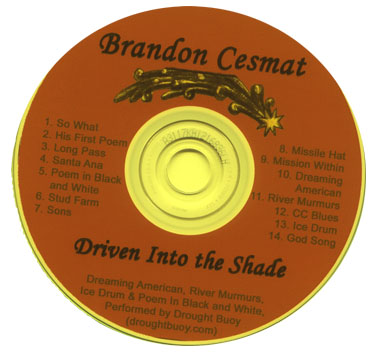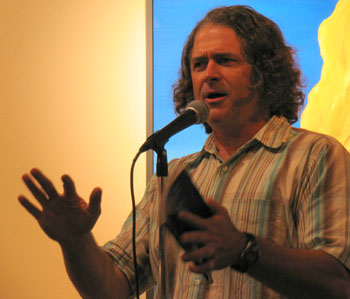From Catullus with love...courtesy of Rebecca Resinski.
Wednesday, August 29, 2007
Thursday, August 9, 2007
BRANDON CESMAT—LIVE

Brandon Cesmat sailed into town after a nice long hike with his cousin in the morning in the Sierras. He arrived, donning his Ovation guitar and gourd rattle, and he plugged his tape loop machine into the PA. We were set.
Brandon went on to give this small audience the ride of its life. He bounced from singing vocalese songs ( a poem entitled “So What” that usurped the melody of Miles Davis’s “So What” complete with harmonized backing vocals as provided by the tape loop machine) to more plaintive and soulful pieces like “The Long Pass” to political-historical romps like “Testosterone Poisoning: A Male Problem.” All from memory.

After “So What” Cesmat launched into a short poem entitled “God Song” whose lyrics were set to a John Coltrane tune. Between stanzas Cesmat improvised on vocal trumpet.
Cesmat then explained about the Santa Ana winds of southern California and read “Santa Ana.” He explained how the poem had become a song after the windswept Paradise Flats fires blew past his house. He jumped in his car, and began thinking about this poem a little more concertedly.
“Where Was Fidel When I Needed Him” ruminated on the story of Elian Gonzalez, and Cesmat took issue with Fidel Castro’s absence when his own father was less than present, his grandfather singing him to sleep instead. Listen to it here [2:22].
Turning to the issue of the night, a culture obsessed with violence, Cesmat endeavored to show the softer side of American football with “The Long Pass,” reaching near epiphanic heights on the gridiron. “Why aren’t there more football poems?” he asked. Why do baseball and boxing garner so much literary attention?
“Testosterone Poisoning: a Male Problem” asked whether it might be better for men to sacrifice one of their testicles in the humanity but worried that too many might sacrifice the wrong one and end up like Hitler.
A newer piece that is not featured in Cesmat’s Driven Into the Shade were next. One entitled “Night Classes” was about the struggles of students who try to balance difficult and busy lives alongside of personal habits that many might not find so admirable.
“Park” features a speaker projecting himself as a car and driving between the people he meets at his class reunion. Such a speaker muses about his place in the world without a garage in the outskirts to return to.
“The Conference” referred to advice given at a writing conference and what it might mean to a poet who puts as much emphasis on putting a poem out into the airwaves as on paper.
Cesmat turned political in “In the Memory Market,” where a shopper is choosing among various different atrocities and brutality that has been perpetrated in the name of maintaining power. Only at the end do we learn that the shop’s proprietor who is keeping his wares on the shelves is really ourselves.
“Lightning, All Directions” is the tale of love in an observatory. (Listen here [1:18])
“The Song of Enough” (Listen here [4:09]) and “Ice Drum” (Listen here [3:01]) rounded out the evening, followed by a form poem ,“The Compassionate Conservative Blues,” a snarky homage to good intentions gone awry.
After forty-five minutes of frivolity and sobriety, Cesmat headed back to his San Diego home, and Sacramento’s small but devoted audience, spirits lifted by a man with a vision of how music can be the tendril wrapped around poetry, was greeted by a very cool and comfortable evening.
Subscribe to:
Comments (Atom)